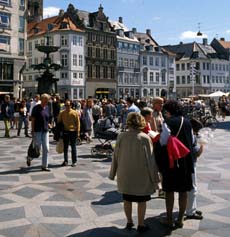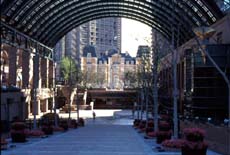index
About distinct place characters
click on images for full-size:





Tracks into town, geometry and usage

Traditional unified place character (Copenhagen)

Little unified character (Tokyo

Traditional place character under seige (London)
I try to make distinctions and claim that cases people think are the same are not really the same. -- Don't you overdo that? Push classification for its own sake? -- I admit that I like to make distinctions -- perhaps because I have read a lot of medieval philosophy -- but the ones I offer are meant to be useful. There is too much overgeneralization in critiques of modern society and in discussion of places, and too much citing of examples, such as Disneyland, that don't quite fit the critiques they are supposed to support. I want to define places as having social grammars for our activities, and distinguish them from locales, locations, and areas. -- You can propose such distinctions but do they really matter for everyday use? -- Distinctions don't have to be useful in daily life if they are useful for analytic purposes. In fact I think the distinction between a locale and a place could be useful in avoiding unduly negative talk about current places by alerting people about the role of place character. Having a unified place character is neither necessary nor sufficient to make an area into a place. -- Why call somewhere without any unifying character a place? -- Because it has social roles and grammars that spread out a landscape for our actions and some norms for those actions. There are many institutional, or temporary, or new places today that do not have unified character in any traditional sense. The notion of place character provides either too much or too little guidance. On the one hand, discussions of character tend to be quite conservative, envisioning place character by recalling traditional, hierarchical, centered places, and calling areas without such character "non-places," even though they have social grammars. This provides only a limited number of social possibilities for "real places," and unhelpful blanket condemnations of current places. On the other hand, if we expand the notion of place character and the kind of unities that will count as good place character, we have no criterion for where to stop, and soon the notion of place character will have lost any critical value.
- [Return to "other terms outline"]
- [Continue on the objections path]
- [Nearby: Objections and replies -- About conditions and closures -- About awareness of context and links ]